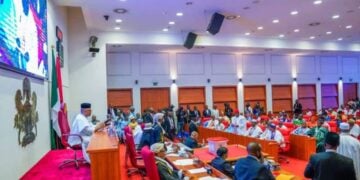The House of Representatives has mandated its Committees on Petroleum (Midstream and Downstream) to investigate the call for the sack of the Chief Executive of the Nigerian Midstream and Downstream Petroleum Authority (NMDPRA), Farouk Ahmed, over what it called unguarded comments against local refineries.
This was sequel to the adoption of an amendment to a motion on “Urgent Need to Address the Outrage Resulting from Unguarded Comments by the NMDPRA Chief Executive”, sponsored by the member representing Oredo Federal Constituency of Edo State, Hon. Esosa Iyawe, at plenary on Tuesday.
Moving the motion, Iyawe noted that fuel quality can impact engine hardware, thus ultra-low sulfur diesel is recommended for all types of companies, power plants, storage tanks, industrial facilities, fleets and heavy equipment, and even ships, as high Sulphur content in fuels causes damage to engines and contributes to air pollution.
Kyari Denies Dangote’s Claim Of NNPC Workers Operating Blending Plant In Malta
He also noted that considering the various risks associated with Sulphur, governments around the world have taken steps to regulate it by setting standards that require maximum reduction of emissions of this chemical compound, which diesel producers are expected to adhere to.
The lawmaker noted that NMDPRA permits local refiners to produce diesel with Sulphur content of up to 650 parts per million (ppm) until January 2025, as approved by the ECOWAS.
He informed that recently, the Chief Executive of the NMDPRA stated that the diesel produced by the Dangote Refinery was inferior to the ones imported into the country, and that their fuel had a large content of Sulphur, which he put at between 650 to 1,200ppm ppm.
Iyawe said in their defence, Dangote Refinery called for a test of their products, which was supervised by members of the House, wherein it was revealed that Dangote’s diesel had a Sulphur content of 87.6 ppm (parts per million), whereas the other two samples diesel imported showed Sulphur levels exceeding 1800 ppm and 2000 ppm respectively, hence disproving the allegations made by the NMDPRA boss.
He expressed concerns that the allegations have been made that the NMDPRA was giving licences to some traders who regularly import high-Sulphur content diesel into Nigeria, and the use of such products poses grave health risks and huge financial losses for Nigerians.
According to the lawmaker, the unguarded statements by the Chief Executive of NMDPRA, which has since been disproved, sparked an outrage from Nigerians who tagged his undermining of local refineries and insistence on the continued importation of fuel an act of economic sabotage, as the imported products have been shown to contain high levels of dangerous compounds.
He expressed worry that the careless statement by the Chief Executive of NMDPRA without conducting any prior investigation is not only unprofessional, but also unpatriotic especially in the face of the recent calls for protest against the Federal Government.
The motion was, thereafter, adopted as amended and referred to the Joint House Committee on Petroleum (Midstream and Downstream), investigating alleged importation of adulterated petroleum products and scarcity of crude oil for refineries, to look into the matter and offer recommendations.





